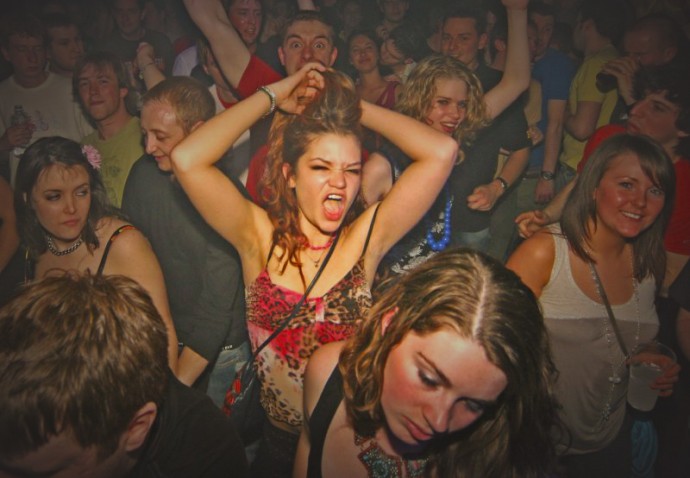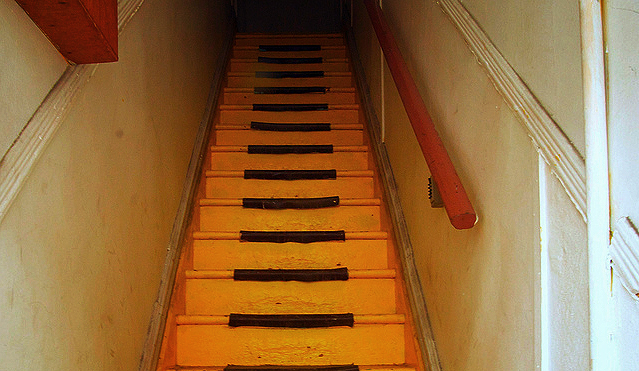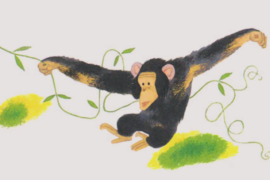Ilana Masad
This is how it works. Responsibilities are divided. One keeps the money in her pockets, another stuffs three cigarettes between her breasts for later in the night and the third is in charge of getting discounted drinks. She, the last of the four, need only look fuckable. To dance.
In high school, they walked down chalky halls with chins down and eyes up, peering through their bangs, dreadlocks, braids, wavy curls. They watched and built up their cache of experience, catching hold of whispered gossip and turning it over between them like leaves of an ancient, fragile book.
Straight As. Big envelopes. They fled to new cities—all to cities—and flourished. The loss of virginities came one after another, so quick it was like a revolver with four bullets shot fast, from the hip, at a single target. Their conversations flowed together: “Did you, did it bleed, did you come, does it hurt, did he call, did he call, will you then, forget him, not worth it.” They began to tell the same stories, ignoring the repetition. This is how it works, she realized.
She started playing around with the truth, Photoshopping in details that added glamor and gloss and taking away the spots, the wrinkles, the fat. Her stories became coin for barter, good enough to bite. Their conversations became less repetitive as the others strove to catch up with her long, swift strides. She was convincing. She had always known she was artistic and her failed attempts at drawing, painting, collage, poetry, theater and the rest of it ceased to matter. She’d found her calling.
Christmas vacation didn’t count as a reunion. They had to spend too much time with old people getting fat in sweaters. They masqueraded as good girls at home, and appearances, they all agreed, were important. They discussed secrets in corners, teeth clinking against glasses of hot cider, making them musical. She told the others of bathrooms, rooftops, and wild subway rides. They laughed too loudly, thighs almost audibly tightening in their slick holiday pantyhose, looking forward to the end of vacation when they could utilize her sensible advice. She gave it in abundance, listening to herself as if she were another spectator, fascinated by her own tales.
Summer didn’t roll around. It came at them head on and going twice the speed limit. The others came to her city because it had the best clubs, the best scene, the best boys. The best was undefinable but you knew it when you saw it. It would alert you, like bonfire sparks singeing your bare arm. This is what she told them. This is how it works.
It happened. For real this time. They went out together, and she was a triumph of excuses, explaining away her lack of experience in the face of their superior knowledge. Her minimal makeup was strategic. Her lack of heels was practical. Her simple outfit, worn to family dinners, was an understated ploy for a specific kind of male specimen who was better than the rest. She worried the cracks were beginning to show but the gin and tonic plastered over the peeling paint. There was nothing like a good G&T, they agreed. They sipped from glasses until they gulped straight from the bottle, mimicking Sesame Street monsters with their expressions of disgust, and when there was only enough left to put in their flasks, it was time to go.
There wasn’t a rope; if there had been, it would have melted away for them. It would have been a given, seeing her at the head of their unit. She looked the best of them all. This was how it worked, they all knew, and they didn’t fight it. She wasn’t the queen bee because they weren’t her workers, but she was Aphrodite and they were only nymphs. She almost believes it this night. She has no role, after all, beyond acting as she’s told them she always does.
So she dances. With her eyes closed and one hand in her hair, she dances. She looks younger than she should. Her friends dance around her, rubbing against men who are boys in the daytime and smiling impishly at boys who are never anything else. They get attention. They lean in, flirt with, smile at. They get pulled away for a drink, for a dance, for a kiss in a corner. But they always come back. Until they don’t.
Her eyes are still shut. She moves in all the right ways. But she’s become untouchable, surrounded by her shell of friends, and when they are gone, a space is left. Left for her, giving her enough air to breathe freely. She’s kept the wind of small town maple trees in her hair, the color of fresh diner coffee in her irises, and the six-years-of-ballet poise in her back. She is sweating perfect droplets of the swimming pool at the Y, smelling of chlorine and shampoo, the clean scent of dirty children. When she opens her eyes to see her friends gone, her mouth opens and she gasps in the space between two songs. Three men turn towards her, reaching out with the instincts of trained lifeguards, but seeing who they’re dealing with, they don’t dare try a rescue.
It doesn’t take long for her to assess the situation. She is alone. No money. No cigarettes. Her phone is in her coat and the ticket is with the pocketed one, who is gone. And that, she knows, is that. There is no other choice.
She returns to the fray. Her eyes are open. She believes everything she’s ever told the others and then some. She scouts, finding the best, knowing it when she sees it. He is dressed nicely, expensively, a little older, and he is alone. She chooses him. She draws near him. She smiles poisonously with her apple-red cheeks and the chlorine sweat takes on a metallic, bloody tang. He responds like Adam—with the feigned innocence of the ignorant.
He gives her money for a taxi later. After. He doesn’t kiss her goodnight. He doesn’t ask for her phone number. He stays in bed, pictures of a woman and children on the dresser beside him and the sheets tangled up between his feet. By the time she leaves, he’s snoring softly in a cloud of satisfied stench. She wants to take something—his packed brown wallet, his fine-toothed comb, his virginity—as a souvenir, as revenge. But he’s called a taxi for someone with a name similar to hers, and she doesn’t want to miss it.
The doorman ignores her. She wants to talk to him, show him her student ID card, pictures of her parents, her Hello Kitty keychain and the condom wrapper which she’s stuffed in her purse with the crazy idea that the woman who lives upstairs could find it and track her down via fingerprints. Drunk logic. She doesn’t approach him, though, the doorman. She opens the door herself, like she would any other day.
The taxi is waiting outside. She climbs in.
“Where to?”
She gives him her address. The dorms. Where the other three are sleeping on her floor, having used the extra key she gave them.
Ilana Masad is an Israeli-American writer living in New York. Her work has appeared in The New Yorker, McSweeney’s, Tin House, Printer’s Row, Hobart, Hypertext Magazine, and more. She is the founder and editor-in-chief of The Other Stories, a podcast for new, emerging, and struggling writers. You can find her tweeting too much @ilanaslightly.




